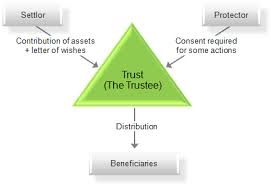
Homeowner and other policies that protect private residences have, for most of their history, been written assuming that the property owner is an individual or married couple. Policies traditionally defined an “insured” or covered person as an individual, married couple or spouse of the individual listed on the policy. However such policies had to respond to a, formerly, rare form of home ownership….trusts.
Besides use as a residence, a home is also often a primary financial asset. As property owners become more sensitive and savvy in handling their finances, the use of trusts to pass on property has expanded. A trust refers to any asset that is controlled or owned by an artificial entity, the trust agreement. Typically, the property owner becomes the trustee, having rights to use the home as a residence, but the legal ownership resides in the trust. The trust allows for tangible property to be passed along to heirs with much more for favorable tax treatment. However, there are consequences that affect insurance coverage and which should not be ignored.
If your home or personal property (furniture, furnishings, etc.) have been transferred into a trust, it is important to share this information with your insurance agent. Then you both may take steps to make sure that the insurance needs of both the trust and the property-users are covered. It is particularly important that liability protection remains intact.
Depending upon the insurer, your homeowner, auto and umbrella policies may have to be modified so that the trust arrangement is specifically recognized and is protected by the policies. It may be that the policy wording already handles things by including trusts or trustees within the meaning of “insured.” In other instances, endorsements may have to be added to include the proper additional insurable interest so that property and liability coverage expands to protect the property held in trust and the trustees.
The existence of a trust means you need to get an insurance professional involved to make sure you can still trust the protection of your various insurance policies.
COPYRIGHT: Insurance Publishing Plus, Inc. 2016+6
All rights reserved. Production or distribution, whether in whole or in part, in any form of media or language; and no matter what country, state or territory, is expressly forbidden without written consent of Insurance Publishing Plus, Inc.

 Contact
Contact
 Email an Agent
Email an Agent

 Click to Call
Click to Call Get Directions
Get Directions


